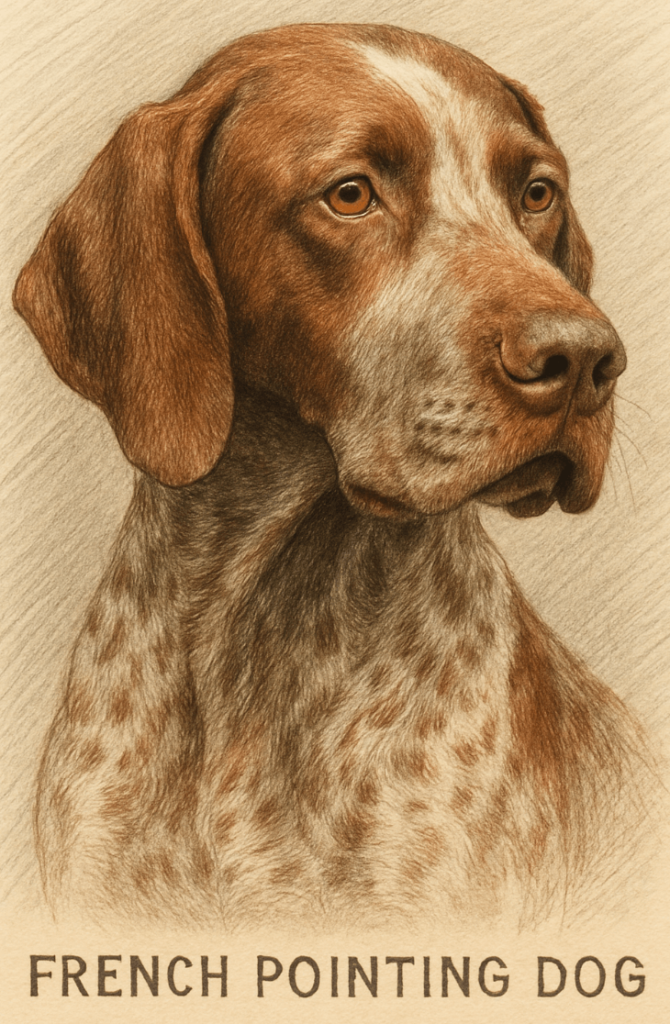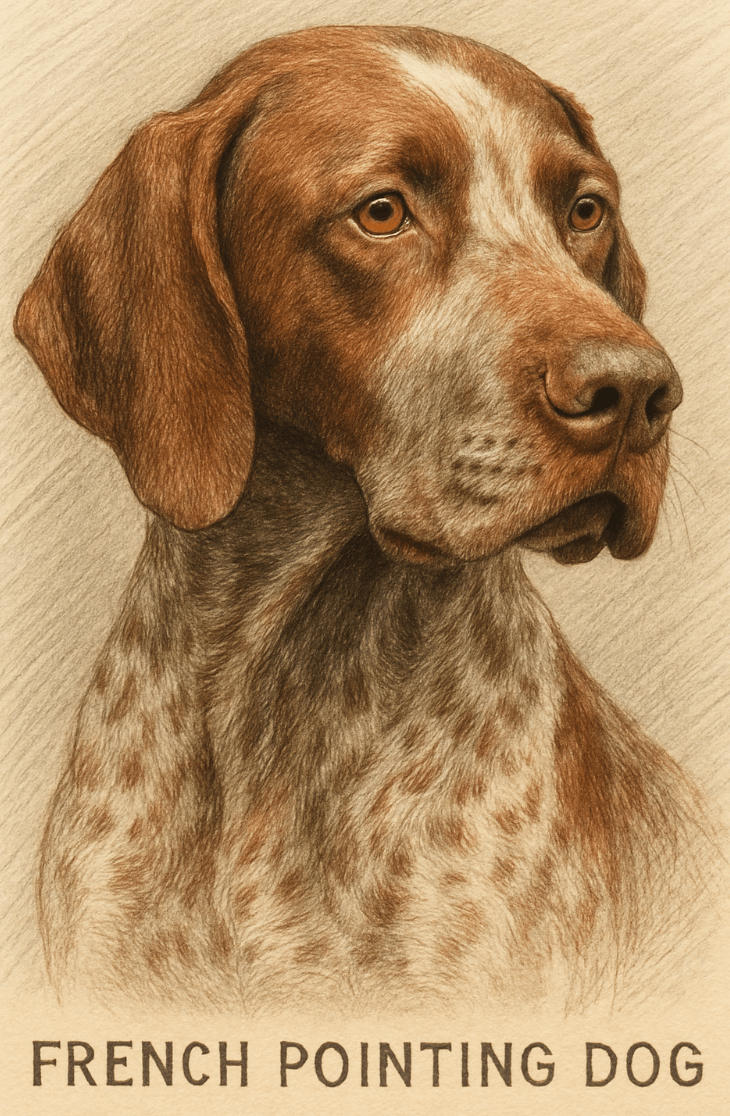French Pointing Dog: The Ultimate Companion for Active Families
The French pointing dog, also known as the Braque Français, is a versatile and elegant breed cherished by hunters and families alike. With its keen sense of smell, natural retrieving instincts, and affectionate nature, this breed has earned a reputation as both a skilled hunting partner and a loyal family pet.
Originating from France, the French pointing dog comes in two distinct types—the larger Braque Français, Type Gascogne, and the smaller Braque Français, Type Pyrénées—each tailored to different terrains and purposes. Whether you’re an avid outdoors enthusiast or simply looking for a devoted companion, the French pointing dog might be the perfect fit. In this blog post, we’ll explore everything you need to know about this remarkable breed, including its history, temperament, care requirements, and more.
Key Characteristics of the French Pointing Dog
The French pointing dog is a breed that combines beauty, intelligence, and athleticism. Understanding its defining traits will help you determine if it’s the right match for your lifestyle.
Energetic and Athletic:
This breed thrives on physical activity and excels in outdoor environments, making it ideal for active owners who enjoy hiking, running, or hunting.Intelligent and Trainable:
Known for their quick learning abilities, French pointing dogs respond well to positive reinforcement and consistent training methods.Affectionate and Loyal:
Despite their working-dog roots, these dogs form strong bonds with their families and love spending time indoors as much as outdoors.Natural Hunting Instincts:
Their exceptional scenting ability and pointing skills make them excellent companions for hunters and field trial enthusiasts.Low Maintenance Coat:
Their short, smooth coat requires minimal grooming but sheds moderately, so regular brushing helps keep shedding under control.
These characteristics highlight why the French pointing dog is a favorite among those seeking a balanced blend of work ethic and companionship.
Physical Traits of the French Pointing Dog
The French pointing dog boasts a striking appearance that reflects its purpose-bred heritage. Here’s what you can expect in terms of their physical attributes.
Size Variations:
The Type Gascogne stands taller at 23-27 inches, while the Type Pyrénées is slightly smaller at 19-23 inches, catering to different preferences and terrains.Color Patterns:
They typically feature a white base coat with liver or orange markings, giving them a classic and elegant look.Muscular Build:
Both types have lean, athletic bodies designed for endurance and agility during long days in the field.Expressive Eyes:
Their warm, intelligent eyes convey their friendly and alert nature, making them endearing to anyone they meet.Graceful Movement:
Whether trotting through fields or lounging at home, their fluid gait and poised demeanor exude elegance.
These physical traits not only enhance their functionality as working dogs but also add to their charm as family pets.
Check this guide 👉Rhodesian Ridgeback French Bulldog Mix: Best 7 Expert Tips!
Check this guide 👉Azawakh French Bulldog Mix: Best 7 Expert Tips!
Check this guide 👉French Bulldog Golden Retriever Mix: Best 7 Expert Tips!

Pros of Owning a French Pointing Dog | Cons of Owning a French Pointing Dog |
|---|---|
High energy level suits active lifestyles | Requires significant daily exercise |
Intelligent and easy to train | Not ideal for sedentary owners |
Affectionate and great with families | Can become destructive without enough activity |
Low grooming needs | Needs early socialization to prevent shyness |
Versatile for hunting and companionship | May struggle in small living spaces |
Training Tips for Your French Pointing Dog
Training is essential to bring out the best in your French pointing dog. Their intelligence and eagerness to please make them highly trainable, but consistency is key.
Start Early:
Begin obedience training and socialization as a puppy to establish good habits and ensure they grow into confident adults.Use Positive Reinforcement:
Reward-based techniques like treats, praise, and playtime motivate them to learn quickly and happily.Focus on Field Training:
If you plan to hunt with your dog, introduce basic commands like “sit,” “stay,” and “come” before progressing to advanced fieldwork.Incorporate Mental Stimulation:
Puzzle toys, scent games, and agility exercises keep their sharp minds engaged and prevent boredom-related behaviors.Be Patient and Consistent:
While smart, they may test boundaries; firm yet gentle guidance ensures steady progress.
With dedication and patience, training strengthens the bond between you and your French pointing dog while unlocking their full potential.
Exercise Needs of the French Pointing Dog
As a high-energy breed, the French pointing dog requires plenty of physical activity to stay happy and healthy. Neglecting their exercise needs can lead to behavioral issues such as chewing, digging, or excessive barking.
Daily Walks and Runs:
Aim for at least 1-2 hours of vigorous exercise per day, including off-leash runs in safe areas.Hunting or Field Trials:
Engage them in activities that mimic their natural instincts, such as retrieving or simulated hunts.Interactive Playtime:
Games like fetch, frisbee, and tug-of-war provide both physical exertion and bonding opportunities.Agility Courses:
Obstacle courses challenge their athleticism and mental focus, keeping them entertained and fit.Supervision During Outdoor Time:
Always monitor them in unfenced areas due to their strong prey drive and tendency to wander.
Meeting their exercise needs ensures a calm, content, and well-adjusted companion at home.
Health Considerations for the French Pointing Dog
Like all breeds, the French pointing dog is prone to certain health issues. Being proactive about their care ensures a longer, healthier life for your furry friend.
Hip Dysplasia:
A common condition in active breeds; maintaining a healthy weight and avoiding overexertion in puppies reduces risk.Ear Infections:
Their floppy ears trap moisture; regular cleaning prevents infections and discomfort.Bloat (Gastric Torsion):
Feeding smaller meals and avoiding strenuous exercise immediately after eating minimizes the likelihood of bloat.Eye Disorders:
Conditions like progressive retinal atrophy (PRA) can occur; routine eye exams help detect problems early.Joint Health:
Supplements like glucosamine and chondroitin support joint function, especially as they age.
Proactive healthcare ensures your French pointing dog remains active and vibrant throughout their life.
Fun Activities to Enjoy with Your French Pointing Dog
Living with a French pointing dog means embracing an active lifestyle. These fun activities will strengthen your bond while keeping them physically and mentally stimulated.
Long Hikes in Nature:
Explore trails together, allowing them to sniff, run, and burn off excess energy in a natural setting.Canine Sports:
Participate in competitions like agility, tracking, or field trials to showcase their skills and boost confidence.Swimming Sessions:
Many French pointing dogs enjoy water; swimming provides excellent low-impact exercise.Obedience Challenges:
Create mini obstacle courses at home or practice advanced tricks to sharpen their focus and discipline.Interactive Toys:
Puzzle feeders, treat-dispensing balls, and chew toys keep them entertained when you’re busy.
Engaging in these activities ensures a fulfilling life for your energetic companion.
Common Misconceptions About the French Pointing Dog
Despite their popularity, several misconceptions surround this breed. Clarifying these myths helps set realistic expectations for potential owners.
They Are Only Suitable for Hunters:
While bred for hunting, they thrive as family pets with proper care and attention.They Don’t Need Much Attention Indoors:
On the contrary, they crave human interaction and suffer from loneliness if neglected.All French Pointing Dogs Act the Same:
Individual personalities vary widely depending on genetics and upbringing.They’re Easy to Manage Without Training:
Though intelligent, they still require consistent training and socialization to reach their full potential.They’re Too Energetic for Families:
With adequate exercise, they adapt beautifully to family life and make wonderful companions.
Dispelling these myths ensures a deeper understanding of this incredible breed.
Frequently Asked Questions About the French Pointing Dog
Is the French pointing dog good with kids?
Yes, their friendly and patient nature makes them excellent companions for children when properly socialized.
Do they require professional training?
While not mandatory, professional guidance can refine skills, especially for hunting or competitive events.
How much grooming do they need?
Minimal grooming is required—regular brushing and occasional baths are sufficient to maintain their coat.
Are they suitable for apartment living?
They can adapt to apartments if given ample exercise, but larger homes with yards are preferable.
What health issues should I watch for?
Common concerns include hip dysplasia and ear infections; regular vet check-ups are crucial.
Embracing Life with a French Pointing Dog
The French pointing dog is a breed that embodies grace, intelligence, and versatility, making it a cherished companion for active individuals and families. Whether you’re drawn to their hunting prowess or their loving demeanor, they offer endless joy and loyalty to those willing to invest time and effort into their care. By understanding their needs and nurturing their talents, you’ll forge an unbreakable bond with this remarkable breed. If you’re ready for the adventure, the French pointing dog could become your ultimate partner in life’s journey.
Understanding Bone Supplement for Cats: Best 7 Expert Tips! – Safe, vet-approved guidance for strong feline bones & balanced nutrition.
Bone Supplement for Dogs: Best 7 Expert Tips! – Expert guide to calcium, collagen & bone health for every life stage.
Understanding Can Cats Get Sunburn: Best 7 Expert Tips! – Protect your feline from UV damage with vet-backed prevention strategies.
How to Train a Seizure Alert Dog: Best 7 Expert Tips! – Learn expert-backed steps to nurture natural instincts into reliable, life-saving seizure alerts.





